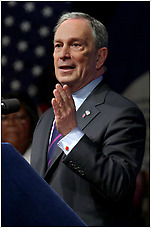 Robert Wright on culture, politics and world affairs.
Robert Wright on culture, politics and world affairs.
Tags:
Mort Zuckerman, owner of The New York Daily News and U.S. News and World Report, is said to be pondering a run for the United States Senate from New York. If he makes the transition to politics, The New York Times noted in reporting his ruminations, he will “be following the path of a close friend and fellow media executive, Mayor Michael R. Bloomberg.”
 Fred R. Conrad/The New York Times Mort Zuckerman during a 2007 interview.
Fred R. Conrad/The New York Times Mort Zuckerman during a 2007 interview.The Bloomberg–Zuckerman comparison raises a question: If you’re really rich and want to get into politics, are you better off a) having built a media company that makes a lot of money, thus conveying an image of vision and competence; or b) having used money made in real estate to buy media companies that don’t make a lot of money but do provide a place for you to write a column, which then helps you become a ubiquitous multimedia pundit?
Among the upsides of being a ubiquitous multimedia pundit are high name recognition and high face recognition. A possible downside is high mind recognition: you leave a clear record of your thinking on the great issues of the day. So voters can research such questions as: Have you ever tried to rush your nation into war without giving the matter careful thought?
Shortly before the Iraq war, when Hans Blix, the United Nations weapons inspector, said more time was needed to figure out whether Saddam Hussein was trying to build weapons of mass destruction, Zuckerman dismissed those who were “fixated on finding a smoking gun” and assured us that when Hussein said he had abandoned W.M.D.’s he was “clearly lying.” (What a timesaver for Blix!)
Zuckerman’s long punditry trail — gigabytes of writing, terabytes of video — probably won’t come back to haunt him.
Then, shortly after coalition troops took Baghdad, Zuckerman wrote: “Those who were so confident that America would mess up the war are now equally assured that America will mess up the peace, but all of them should be prepared to bite their tongues.” Sure, there would be problems, but “we are dealing with the problems of success, not with the problems of failure. In foreign policy, that is heaven.”
In case you’re wondering what hell would have looked like, Zuckerman had provided helpful illumination before the war. You see, if we didn’t invade Iraq, our inaction would empower, among others, “Shiite Islamists, personified by their ruling mullahs in Iran.” Imagine that.
These isolated quotations don’t do justice to the melodramatic, borderline-hysterical tone of Zuckerman’s writing about the imminent threat supposedly posed to the United States by Iraq. When the next chance to attack a country comes up, I personally would prefer to have as many non-hysterics in the Senate as possible. Is it too much to hope that voters would agree — that any candidate who was so vehemently wrong about the Iraq fiasco would have trouble getting elected to the Senate?
Yes, I’m afraid that is too much to hope. Foreign policy isn’t central to the concerns of most voters. And, in particular, being wrong on Iraq seems not to have hurt the careers of many politicians (or pundits or policy analysts, come to think of it).
Besides, when Zuckerman’s electoral opponent’s oppo-research team scours his trail of utterances, they’ll be looking for an unguarded remark that offends some interest group or an opinion that, taken out of context, terrifies or enrages the easily terrified or enraged. The last thing they’ll be looking for is something truly indicative of his way of thinking and directly relevant to his future performance. And, should they stumble upon such a thing, they’ll rule it out if it requires much explanation.
I would recommend the Bloomberg model for converting financial power into political power.
For example: Before the war, Zuckerman, intent on depicting Saddam Hussein as suicidally irrational, wrote that “in 1993 he tried to assassinate former President George Bush in Kuwait — even though a successful plot would have caused the American government to destroy Saddam and his regime, whatever the cost.”
Now, the more you think about this, the less sense it makes. Remember, if the plot had been successful, there wouldn’t have been a bunch of evidence linking it to Hussein; his operatives wouldn’t have been caught and so wouldn’t have confessed their connection to Iraq; and the bomb, rather than being studied in detail by forensics experts, would have blown up. Presumably Hussein assumed that the lack of solid evidence of his complicity would keep the United States from invading his country.
Of course, he might have been proved wrong — maybe America would have mounted a full-scale invasion of Iraq even in the absence of solid evidence of Hussein’s complicity. But that would mean he made an error of judgment, not that he was suicidally insane.
This distinction is very important for purposes of American strategy, so Zuckerman’s inattention to it is kind of alarming. But even though the distinction isn’t all that subtle, it’s way too subtle to show up in a campaign commercial, or even the average candidates’ debate.
So Zuckerman’s long punditry trail — gigabytes of writing, terabytes of video — probably won’t come back to haunt him in any valid way. But it may well come back to haunt him in an invalid way, via distortion. (He wants to control health care costs. Ever hear of death panels?)
 Richard Perry/The New York Times Mayor Michael Bloomberg at this year’s state of the city speech.
Richard Perry/The New York Times Mayor Michael Bloomberg at this year’s state of the city speech.All told, then, I would recommend the Bloomberg model for converting financial power into political power: just leave an impressive business record and skip the weekly column and the funny-at-the-time remarks on “The McLaughlin Group” and “Morning Joe.” (Also: avoid blogging — something Zuckerman has done at both The Huffington Post and The Daily Beast. In the absence of editorial oversight you might find yourself penning a critique of the Obama administration that reads like the transcribed remarks of a guy sitting on a bar stool at closing time.)
In a way it’s disconcerting that the Bloomberg model is the better one. I’d rather live in a world in which a person could spend a life candidly expressing serious opinions without fear that their eventual distortion would preclude public service. Then again, I’d rather live in a world in which a person’s having been wrong on the biggest foreign policy question of the past decade would reduce his or her chances of winding up in the Senate. For that matter, I’d rather live in a world in which it wasn’t easy for people to convert money into power, whether the power of the pen or the power of politics.
But we don’t seem to live in any of those worlds.










